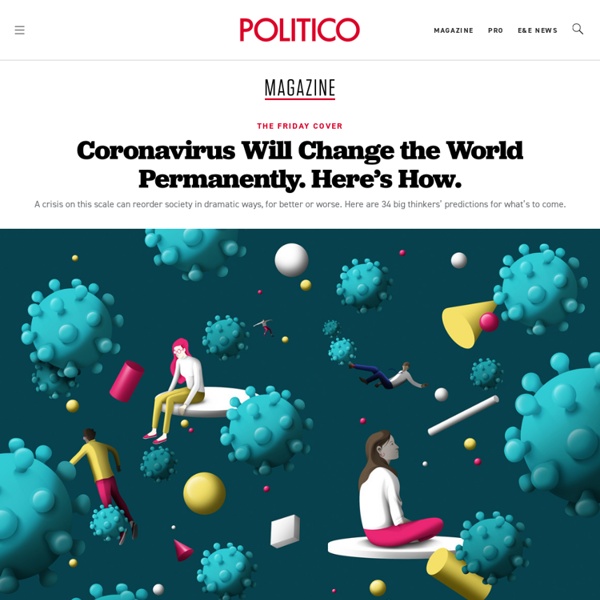There will be no 'back to normal'
The pandemic will change the world permanently and profoundly. Even if countries can control the spread of COVID-19 in the coming months, there will be vast political, economic, social, technological, legal and environmental consequences which will last many decades. In this article, we summarise and synthesise various - often opposing - views about how the world might change. Clearly, these are speculative; no-one knows what the future will look like. But we do know that crises invariably prompt deep and unexpected shifts, so that those anticipating a return to pre-pandemic normality may be shocked to find that many of the previous systems, structures, norms and jobs have disappeared and will not return.
What our future could look like after COVID-19 restrictions lifted
Photos from around the world show some of the strange and innovative ways we can safely reopen to try and prevent the pandemic from spreading. In Canada provinces have been releasing plans for easing restrictions that were put in place to limit the spread of COVID-19. Open this photo in gallery: Story continues below advertisement
The Virus Changed the Way We Internet
Stuck at home during the coronavirus pandemic, with movie theaters closed and no restaurants to dine in, Americans have been spending more of their lives online. But a New York Times analysis of internet usage in the United States from SimilarWeb and Apptopia, two online data providers, reveals that our behaviors shifted, sometimes starkly, as the virus spread and pushed us to our devices for work, play and connecting. We are looking to connect and entertain ourselves, but are turning away from our phones Feb. 29 First U.S. Covid-19 death
Dan Andrews has left a trail of sneaky hints that reveal lockdown 'WON'T end for weeks' in Melbourne
Lockdown restrictions could remain imposed on Victorians for many weeks, Daniel Andrews has hinted. The Victorian Premier is set to reveal a decision on Sunday about whether his government will ease the strict Stage 4 rules that have closed down Melbourne for more than a month. However, speaking on Saturday as Victoria announced another 76 new coronavirus cases and 11 deaths, Mr Andrews hinted that the prohibitive measures would continue as long as COVID-19 remains a threat. Stage 4 restrictions in Melbourne, and Stage 3 in the rest of the state, were set to lift on September 13 at 11.59pm after weeks of enduring the miserable lockdown
How the Economy Will Look After the Coronavirus Pandemic
After many weeks of lockdowns, tragic loss of life, and the shuttering of much of the global economy, radical uncertainty is still the best way to describe this historical moment. Will businesses reopen and jobs come back? Will we travel again? Will the flood of money from central banks and governments be enough to prevent a deep and lasting recession, or worse?
What will life be like after the coronavirus pandemic ends?
As 2020 blessedly clangs to a close, it’s tempting to wonder where we’re headed once the pandemic is history. In the spirit of year-end curiosity about COVID-19’s possible long-term effects, Science News posed this question to a few scholars: What major social changes do you see coming after the pandemic? As baseball’s Yogi Berra once said, “It’s tough to make predictions, especially about the future.” The following forecasts, edited for length and clarity, aren’t written in stone and aren’t meant to be. But they raise some provocative possibilities.
He Could Have Seen What Was Coming: Behind Trump’s Failure on the Virus
The shortcomings of Mr. Trump’s performance have played out with remarkable transparency as part of his daily effort to dominate television screens and the national conversation. But dozens of interviews with current and former officials and a review of emails and other records revealed many previously unreported details and a fuller picture of the roots and extent of his halting response as the deadly virus spread: The National Security Council office responsible for tracking pandemics received intelligence reports in early January predicting the spread of the virus to the United States, and within weeks was raising options like keeping Americans home from work and shutting down cities the size of Chicago. Mr. Trump would avoid such steps until March.Despite Mr.
Second Victorian COVID-19 anti-lockdown protest planned
Melbourne is bracing for another anti-lockdown protest with more than 1,000 planning a “freedom walk” amid stage four COVID-19 restrictions. After violent anti-lockdown protests at the Shrine of Remembrance and surrounding areas on the weekend, some 1,100 Facebook users have signalled their commitment to walk the Royal Botanic Gardens’ Tan track this Saturday. The “freedom walk” claims to be legal and asks citizens to “come together, get healthy and talk about getting our freedoms back”. In a statement on Wednesday, Victoria Police said it was aware of the event and is monitoring the potential protest activity. “We are currently making a number of enquiries in relation to this and remain in the process of planning our operational response,” the statement said.
Rolls-Royce launches COVID-19 data alliance to aid economic recovery – Government & civil service news
The International Monetary Fund expects the world economy to shrink at its fastest pace in decades, raising fears the COVID-19 pandemic could trigger the worst recession since the 1930s Great Depression. (Photo by Rafael Matsunaga via flickr). Luxury car manufacturer Rolls-Royce has established a data alliance formed of tech companies and data analytics experts that aims to help governments and businesses find new ways to mitigate the impact of coronavirus on the global economy.




34 experts se prononcent sur comment le coronavirus va changer le monde dans divers «domaines»: Community Tech Health / Science Government Elections The Global Economy Lifestyle by rosaliegn Mar 23